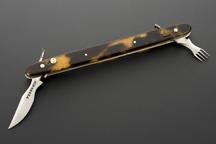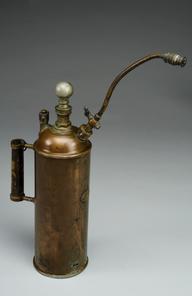Mobile Wash Basin Unit from NHS Nightingale North West
Mobile sink unit. Used in the NHS Nightingale North West temporary hospital to provide appropriate handwashing facilities for a hospital. NHS Nightingale NW was set up in the Manchester Central Convention Centre in 2020 during the COVID-19 pandemic to provide additional hospital bed space to reduce strain on permanent NHS hospitals. As a convention centre, and ex-railway station, the building did not have the right plumbing to have a sink on every ward. These mobile sink units contain two water cooler bottles in the base, one full of clean water and one empty. The full, clean bottle provides water to the tap and the dirty water drains from the plug into the empty bottle until the clean bottle is empty and the dirty bottle is full and then they are replaced. This enabled a sink to be installed on each ward to ensure hospital-level hygiene without expensive, disruptive and time-consuming plumbing work.
In early 2020 when the COVID-19 pandemic grew in the UK, there was a concern that the NHS would be overwhelmed. The construction of temporary hospitals highlights the scale of the pandemic. In March 2020 Manchester University NHS Foundation Trust was asked to open a temporary hospital to provide additional facilities to care for COVID-19 patients in the North West. NHS Nightingale North West (NNW) was set up in Manchester Central. It accepted its first patient in the space of 14 days.
This material illustrates both the public health response to the pandemic and the collaboration between industries and societal organisations like the NHS and the army to construct and equip the Nightingales in such a short space of time. It represents the problems of supply of many different goods and the important role of the manufacturing and building industries in the response to the pandemic.
The Nightingales also emphasise the fast moving and ever changing nature of our understanding of the virus and pandemic. It was set up to take thousands of patients but never came close to full capacity. NNW admitted more patients than most Nightingale hospitals as it was set up on different clinical lines.
The first phase of use ran until summer 2020 and admitted 104 patients. The hospital was then stood down over summer as cases of COVID-19 reduced. As cases began to rise again with the UK’s second wave, it was quickly brought back into use. NNW was reorganised to take non-COVID patients for rehabilitation to free up space for COVID patients in permanent hospitals. NNW reopened on 28th October 2020 and admitted 350 patients in this second phase. The last patient was discharged in the third week of March 2021.
- Object Number:
- 2022-40/1
- type:
- wash basin






